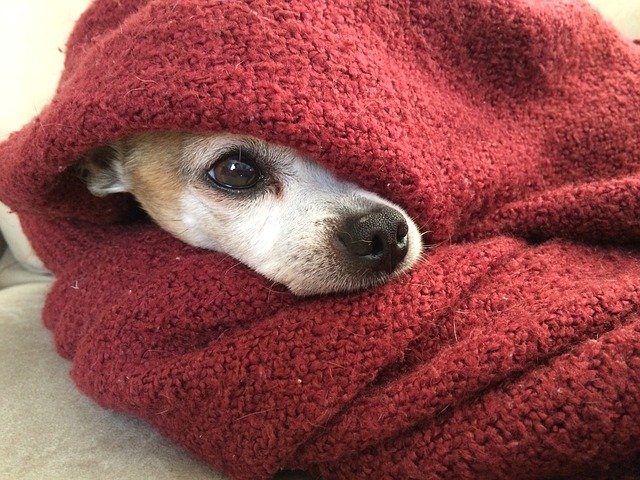
What To Do If Your Dog Has Anxiety
Anxiety is one of the most common things owners tell us about when they bring their dogs in to our clinic. Before I discuss the interventions that can be tried to help dogs with anxiety, I will focus on what causes anxiety in dogs, and what can be done to prevent anxious dogs in the first place.
Dogs tend to have separation anxiety when their owners are away. Another major cause of dog anxiety is fear of loud noises like construction, fireworks and thunder.
Start Socializing Early
An early start to training and socialization can give puppies a head start in the world by exposing them to various potentially scary stimuli that they might eventually encounter out in the world. Veterinary behaviorists teach us that early socialization and experience is critical and that between 8-12 weeks of age puppies will accept new sights, sounds, and smells as safe and normal parts of the world. After 12 weeks they can start to develop fear responses to new or scary stimuli and this is the time that they can will become fearful.
I often hear from owners that their rescue dogs have a fear of men with hats or gunshots; I believe it is because those puppies had a negative experience during this critical period of sorting out the good from the bad.
Early training can help puppies avoid anxiety
I recommend signing up for a puppy class before 12 weeks and practicing positive reinforcement training techniques using treats and clicker training. You can find more information and techniques in the books “Perfect Puppy in 7 Days” and “How to Behave So Your Dog Behaves” by Dr. Sophia Yin. I also recommend early exposure to children, cats and anything else that they may expect to encounter later on in life. By giving puppies good socialization, exercise and mental stimulation they will usually turn out to be happy well adjusted dogs.
Exercise and training keep adult dogs stress-free
So what do you do if your dog or puppy is already anxious? Regular exercise and mental stimulation is very important for a dog (and human) emotional well being. I recommend long walks, training sessions, and puzzle toys to help keep your dog occupied and keep stress levels low.
Separation Anxiety in Dogs
Sometimes no matter what you do, your dog will have anxiety when you leave the house. If this is the case it is helpful to try and put yourself in your dog’s shoes. They can’t understand that you are going to work and will come back soon, as far as they know you may be gone forever.
Say goodbye: Having a goodbye ritual where you give treats and engage with your dog before leaving can actually make things worse by reinforcing an excited/anxious state rather associated with your leaving rather than a calm quiet state.
Crate train your dog: This can help to prevent separation anxiety because it harnesses your dog’s natural instincts to find security in a den.
- Start with a crate that is just big enough for your dog or puppy to stand up, turn around and lie down in.
- Give treats when going in. I recommend giving high value treats when going into the crate and feeding the dog in their crate so that they associate the crate with positive experiences.
- Never use the crate as a punishment or time out.
- Don’t give treats when coming out. When taking the puppy or dog out of the crate, do not give them any attention or treats as going into the crate should be rewarded. The dog should not associate coming out of the crate with treats or else you will be teaching them to try to get out of the crate rather than to want to go in.
- Make it a cave. Once the dog is comfortable in the crate you can try adding blankets and covering the crate to make it as dark and cave-like as possible as dogs like to have a small, comfortable nook to sleep in. I recommend keeping the crate open and allowing the dog to sleep in it whenever he or she would like.
Dogs That Fear Loud Noises
Some dogs are extremely fearful of low, loud noises like thunder, gunshots, or fireworks.
Thundershirt: These special vests work like a tight hug, which some dogs find comforting. You can buy them at www.thundershirt.com.
Adaptil pheromones: These sprays works by using the smell of a nursing mother dog to give your dog a feeling of calm. When using Adaptil use 8-15 sprays (it will smell like alcohol to you or I) on bedding or your dog’s favorite spots, 5-10 minutes before stressful events, such as a fireworks show, house party, or other noisy event. Purina also makes a probiotic supplement called Calming Care which may help if used consistently by adding to food for 6-8 weeks.
Talk to a vet
If the holistic options like pheromones and thunder shirts aren’t working well enough to control your dogs anxiety, talk to your veterinarian about pharmacologic options to use either long term or as needed for events like fireworks.
Me and the other vets at EMRVC want your relationship with your pet to be stress-free. Contact us if you need help dealing with your dog’s anxiety.
— Dr. Shawn Budge
Essex Middle River Veterinary Center provides medical and surgical care for cats and dogs at our animal hospital and veterinary clinic in Essex, Maryland, just outside of Baltimore. Our services include preventive wellness care exams, vaccines, spays/neuters, and a variety of specialized care. Our state-of-the-art veterinary offices are conveniently located near I-695 where we see pets from Towson, Honeygo, White Marsh, and other neighboring Baltimore areas.
